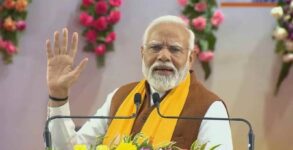“If liberty means anything at all, it means the right to tell people what they do not wish to hear.” This quotation is from a novel named Animal Farm written by Eric Arthur Blair better known by his pen name George Orwell. An English novelist, essayist and journalist whose works were profoundly against imperialism, totalitarianism and social discrimination. He had penned down many novels and essays but Animal Farm and 1984 were among his best works.
Motihari, a rural town in Bihar’s Champaran district, was the place where MK Gandhi staged his first satyagraha (non-cooperation) campaign against oppressive taxes on indigo farmers in 1917. But this land had the privilege of having an anti-imperial icon i.e. George Orwell in its fold. Born on June 25, in 1903 in Motihari – the headquarters of East Champaran district (Purbi Champaran district, Tirhut Division) in the Indian state of Bihar. It is 25 km east of Dhaka town and 89 km northwest of Muzaffarpur city.
Orwell’s father worked as an assistant sub-deputy agent in the Opium Department of the Indian Civil Service.
Orwell lived in India for one year before moving to England, where he grew up and attended school. On parents suggestion, he joined the foreign service as Imperial Indian Police officer in Burma, the then province of British India from 1922 to 1927.
After passing the entrance examination, Orwell worked for the Imperial Indian Police in Burma, a province of British India, from 1922 to 1927. Later he shifted his interest towards journalism. The Pioneer, a weekly journal in Lucknow, invited Orwell to be an assistant editor and chief leader writer but it remained unfulfilled due to his deteriorating health.
Orwell’s final involvement with British India took place while he was employed by London’s British Broadcasting Company (BBC). Orwell worked at the BBC for just 27 months, from August 1941 to November 1943, and described the atmosphere there as “something half-way between a girls’ school and a lunatic asylum”.
He initially worked part-time, making a few radio broadcasts for their Eastern Service in early 1941, and then full-time as Talks Assistant and later as Talks Producer in the Indian Section of their Eastern Service. At the BBC, Orwell got the opportunity to work with Balraj Sahni, an Indian Programme Assistant, Hindi-language broadcaster and who later went on to become a famous actor of India cinema.
Some of Orwell’s most popular works include “Notes on Nationalism,” “Politics and the English Language,” “Why I Write,” “The Prevention of Literature,” “Thoughts on the Common Toad,” and “Reflections on Gandhi”
In 1949, George Orwell published “Reflections on Gandhi,” in which he offered a posthumous portrait of the grand leader of Indian independence.
He wrote, “I have never been able to feel much liking for Gandhi, but I do not feel sure that as a political thinker he was wrong in the main, nor do I believe that his life was a failure. It is curious that when he was assassinated, many of his warmest admirers exclaimed sorrowfully that he had lived just long enough to see his life work in ruins because India was engaged in a civil war which had always been foreseen as one of the byproducts of the transfer of power. But it was not in trying to smooth down Hindu-Moslem rivalry that Gandhi had spent his life. His main political objective, the peaceful ending of British rule, had after all been attained.”
Geroge Orwell’s novel 1984 was about a dystopian future where critical thought is suppressed under a totalitarian regime became world’s bestselling book. As its relevance fits aptly on the contemporary situation of India where controversies of around the country turning into a surveillance state with a democratic character, foreseeing ability of Orwell in terms politics is admirable.
Identifying and Preserving Orwell’s history In 1983, a Scottish journalist Ian Jack travelled to the town of Motihari in Bihar, went through documents at archives kept at Motihari collectorate and had found the place where George Orwell was born.
In a piece published in 1984 in the Sunday Times, titled “In search of a Jaarj Arwil”, Jack recounted that locals were clueless that their town was the writer’s birthplace, and that it took a string of enquiries before he finally found the opium godown where Orwell’s father, Richard Blair, had worked as an employee of the Opium Department of the Indian Civil Service.
But identifying birthplace was not enough until it became a historically momentous preserved monument.
Debapriya Mukherjee, who is an Orwell enthusiast based in Motihari spearheaded the efforts to restore the birthplace of the iconic writer. 2003 the Rotary Motihari Lake Town decided to take initiative and commemorate Orwell’s centenary year celebration and a statue came up at his birth place.
In 2010, members of the George Orwell Commemorative Committee and the Motihari Rotary Club further proceeded to persuade the state government to declare the property a protected area under the Bihar Ancient Monuments Protection Act of 1976 and was done successfully. In 2012, The Rotary Motihari Lake Town took to the Internet to garner support for the conservation of the house he was born in.
Propagating Orwell’s Significance– Bishwajeet Mukerjee, a documentary filmmaker and former journalist decided to explore the historical significance of Champaran which was home to not only one but two legends who had put up a fight against imperialism and totalitarianism. They were Geroge Orwell and MK Gandhi. A documentary named “George Orwell- In the land of Satyagraha” was released in 2016 which had received three international awards and at Darbhanga International Film Festival.
So, the land of Satyagraha did not envisage that it would have become home to someone who was one of imperialism’s fiercest critics. 14 years after the birth of Orwell, Gandhi led the Champaran satyagraha in 1917 but even after a century society of Motihari and people of Bihar majorly remain aloof from this fact of pride.
Motihari hosts one of the last century’s greatest writers (George Orwell) with one of the last century’s very great political leaders (Gandhi) making this small town of Bihar a deserving place for international tourism.
But sadly, the birthplace of an icon has turned to be a den of anti-social elements and criminals. The memorial is devoid of facilities such as security, electricity. This ignorance of the state government along with local administration is failing us for not preserving memories of a man whose ideas against British imperialism coincided with that of “Father of the Nation” Mahatma Gandhi. On his birth anniversary, we can just hope that the zeal to know him more, explore his writings and understanding them becomes the priority of masses.





















